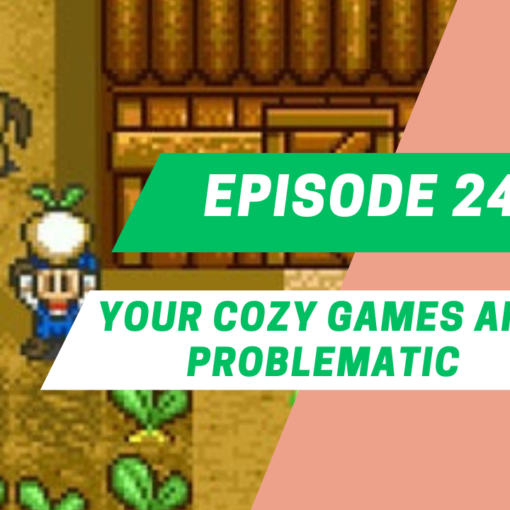I’ve written before about our household habits of creating multiplayer where there is none, specifically in State of Decay, but my husband and I often find ways to share single-player experiences. I was thinking about this earlier this week, as we were yelling Stardew Valley tips at each other across the house (where’s the catfish? it’s gotta be raining!) and wondering why we do it. It’s not new; plenty of friends, roommates, and couples position themselves together in physical space while playing the same (or different) games, and certainly discussions of games and gameplay dominate friend groups, if the continued discussions of Pokémon Sun and Moon around me mean anything. But we do this often, and purposefully, often playing games outside our usual choices if we’re around it long enough, and I think there’s two specific reasons for it: efficiency and, quite simply, shared media experience.
Regarding the latter: we don’t watch a lot of television or movies. We’re simply too busy, for one, and for two, I don’t like to multitask when I’m watching something, like many people do, so it becomes doubly hard to carve out the time (I mean, I need that time for games), and when we do make time, it can be hard to agree on something. While we agree on a lot of epic, sprawling efforts, and sometimes on sci fi and horror, he loves bad movies (the worse the better) whereas I do not, and I love period dramas, which he’ll watch with me sometimes, but not often. Here, we cross over to one another’s tastes less often than we do with games, perhaps due to the malleability of gameplay; we can often shift in a game, playing our way, getting what we want out of it, but a movie is often just a movie. Maybe you interpret moments differently, but there aren’t many choices. Perhaps this is why we can’t much agree on books, either.
So sharing games in this way becomes a way for us to bring our experiences together, even if we’re not playing the same way. We can trade tasks, too, trusting each other to take over for a minute if something calls us away (I gotta make a call; sneak through this building real quick!), and it gives us common ground when we’re separated by work, by time, and by responsibilities with the children. There are days when our schedules absolutely refuse to align, particularly since the beginning of this semester, and so our conversations consist mainly of bringing each other up to date on the kids, politics, and nifty discoveries in Stardew Valley or memorable Hearthstone matches. It’s easy to play a day in SV or take a break from research to play a match or two; it’s more difficult to shift my schedule around to watch a whole movie at the same time he can.
This gets harder when we’re playing different things. I wandered in one day while he and our eldest were playing Oxenfree, and I’d missed the first half of the story. They still talk about it, as a shared point of reference, but here I’m left out. He sat with me for a small part of Firewatch, but finally read up on the entire plot so he could talk about it with me because he got tired of listening to me talking to others when he didn’t get it.
Which gets back to the notion of efficiency. Broken conversations about games, when one participant has only scraps of knowledge about it, just aren’t that effective, especially when you’re trying to squeeze conversation time in around everything else. Why do all that when we can just randomly text one another about a quest reward or a crop update?
Okay, honestly, I know what you’re thinking and our relationship isn’t as sad as it sounds here. It’s just that, well, getting a PhD is hard and time is at a premium. And I like getting texts about his greenhouse full of starfruit. It’s fun, and distracting, like playing vicariously.
It’s efficient, too, for us to share info. He made a reference card for fish in Stardew Valley; I played Dishonored 2 first and could warn him of risky places and decisions before he got to them. For both of us, the gameplay becomes easier, more seamless, less prone to time wasted, and that, too, is a boon.
We all create systems that help us navigate life, to minimize the bad and maximize the good, to help tread water through the neutral. These are ours: sharing what can’t be traditionally shared, creating linked experiences, twining our play together so that we both become stronger. Sometimes that’s all we need.




